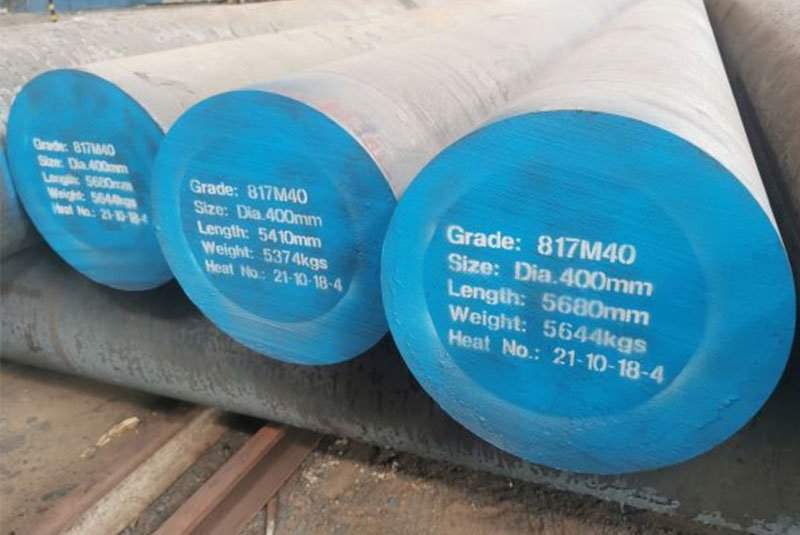Introduction
Alloy steels are an essential material in the manufacturing industry due to their enhanced mechanical properties and versatility. Unlike carbon steel, alloy steels are made by adding various alloying elements to iron and carbon, which significantly improves their strength, hardness, toughness, and resistance to wear and corrosion. Understanding the properties of alloy steel is crucial for manufacturers who aim to optimize their products and processes. In this comprehensive guide, we will delve into the key properties of alloy steel, their benefits, and their applications in manufacturing. By the end of this article, you will have a thorough understanding of why alloy steel properties matter in manufacturing.
What is Alloy Steel?

Alloy steel is a type of steel that is alloyed with various elements to improve its mechanical properties. These elements, which can include manganese, silicon, nickel, titanium, copper, chromium, and aluminum, are added in specific proportions to achieve desired characteristics. The resulting alloy steel exhibits superior performance compared to carbon steel in terms of strength, hardness, toughness, and resistance to wear and corrosion.
Common Alloying Elements and Their Effects
| Alloying Element | Typical Percentage | Effect on Steel Properties |
|---|---|---|
| Manganese | 0.30% – 2.00% | Increases toughness and hardenability |
| Silicon | 0.20% – 2.00% | Enhances strength and elasticity |
| Nickel | 0.50% – 5.00% | Improves toughness and corrosion resistance |
| Chromium | 0.50% – 18.00% | Increases hardness, strength, and wear resistance |
| Molybdenum | 0.10% – 0.50% | Enhances hardenability and strength at high temperatures |
| Titanium | 0.01% – 0.10% | Reduces grain size and prevents carbide formation |
| Copper | 0.20% – 0.50% | Improves corrosion resistance |
Key Properties of Alloy Steel
Alloy steels are known for their remarkable mechanical properties, which make them suitable for a wide range of applications. Here are some of the key properties of alloy steel:
Strength and Hardness
One of the most significant advantages of alloy steel is its high strength and hardness. The addition of alloying elements such as chromium, molybdenum, and manganese enhances the steel’s ability to withstand high stress and impact without deforming or breaking. This makes alloy steel ideal for applications that require high durability and resistance to wear.
Toughness
Toughness is the ability of a material to absorb energy and plastically deform without fracturing. Alloy steels exhibit excellent toughness, making them suitable for applications that involve high-impact forces. Elements like nickel and chromium contribute to the toughness of alloy steel, allowing it to perform well under extreme conditions.
Wear Resistance
Alloy steels are highly resistant to wear and abrasion, thanks to the presence of hardening elements such as chromium and molybdenum. This property is particularly important in applications where the steel is subjected to constant friction and mechanical wear, such as in gears, bearings, and cutting tools.
Corrosion Resistance
The corrosion resistance of alloy steel is significantly improved by adding elements like chromium, nickel, and copper. Chromium, in particular, forms a protective oxide layer on the surface of the steel, preventing oxidation and corrosion. This makes alloy steel an excellent choice for applications exposed to harsh environments and corrosive substances.
Heat Resistance
Alloy steels can maintain their strength and hardness at high temperatures, making them suitable for applications that involve exposure to extreme heat. Elements like molybdenum and chromium enhance the steel’s ability to resist thermal degradation, ensuring long-term performance in high-temperature environments.
Ductility and Formability
Despite their high strength and hardness, alloy steels retain good ductility and formability, allowing them to be shaped and fabricated into various forms. This property is crucial for manufacturing processes that involve bending, drawing, and machining.
Machinability
The machinability of alloy steel refers to how easily it can be cut, shaped, and finished using machining tools. Alloy steels are designed to offer a good balance between hardness and machinability, making them suitable for manufacturing complex components with precise tolerances.
Applications of Alloy Steel in Manufacturing
The enhanced properties of alloy steel make it an indispensable material in various manufacturing industries. Here are some of the common applications of alloy steel:
Automotive Industry
In the automotive industry, alloy steels are used to manufacture components that require high strength, durability, and resistance to wear. These include engine parts, transmission components, axles, and suspension systems. The use of alloy steel ensures the reliability and longevity of critical automotive parts.
Construction Industry
Alloy steels are widely used in the construction industry for structural applications. Their high strength, toughness, and corrosion resistance make them ideal for constructing buildings, bridges, and infrastructure projects. Alloy steel rebar, beams, and columns provide the necessary support and stability for large structures.
Aerospace Industry
The aerospace industry relies on alloy steels for manufacturing aircraft components that must withstand extreme conditions. Alloy steels are used to make landing gear, engine parts, and structural components due to their high strength-to-weight ratio, heat resistance, and toughness.
Oil and Gas Industry
In the oil and gas industry, alloy steels are used for drilling equipment, pipelines, and pressure vessels. The corrosion resistance and high strength of alloy steel make it suitable for handling the harsh environments and high pressures encountered in oil and gas extraction and transportation.
Tool and Die Industry
Alloy steels are essential in the tool and die industry for manufacturing cutting tools, dies, and molds. Their hardness, wear resistance, and machinability make them ideal for producing tools that maintain their sharpness and precision over extended use.
Power Generation
In power generation, alloy steels are used in the construction of turbines, boilers, and heat exchangers. Their ability to withstand high temperatures and pressures ensures the efficient and reliable operation of power plants.
Heavy Machinery
Alloy steels are used to manufacture heavy machinery and equipment for industries such as mining, construction, and agriculture. Their strength, durability, and resistance to wear enable these machines to perform demanding tasks under challenging conditions.
Comparison Table: Alloy Steel vs. Carbon Steel
To better understand the advantages of alloy steel, let’s compare its properties with those of carbon steel:
| Property | Alloy Steel | Carbon Steel |
|---|---|---|
| Strength | Higher due to alloying elements | Lower, depends on carbon content |
| Hardness | Higher, can be heat-treated | Lower, less responsive to heat treatment |
| Toughness | Higher, better impact resistance | Lower, more brittle |
| Wear Resistance | Higher, resistant to abrasion | Lower, wears out faster |
| Corrosion Resistance | Higher, due to elements like chromium | Lower, prone to rust and oxidation |
| Heat Resistance | Higher, maintains properties at high temperatures | Lower, degrades at high temperatures |
| Ductility | Good, can be formed into various shapes | Variable, generally lower |
| Machinability | Good, balance between hardness and ease of machining | Variable, generally easier to machine |
Heat Treatment and Alloy Steel Properties

Heat treatment is a crucial process in enhancing the properties of alloy steel. By carefully controlling the heating and cooling processes, manufacturers can achieve desired mechanical properties such as increased strength, hardness, and toughness. Here are some common heat treatment processes for alloy steel:
Annealing
Annealing involves heating the alloy steel to a specific temperature and then slowly cooling it. This process relieves internal stresses, improves ductility, and enhances machinability.
Quenching
Quenching involves heating the alloy steel to a high temperature and then rapidly cooling it in water or oil. This process increases the hardness and strength of the steel but may reduce its ductility.
Tempering
Tempering is performed after quenching to reduce brittleness and improve toughness. The alloy steel is reheated to a lower temperature and then cooled, balancing hardness and ductility.
Normalizing
Normalizing involves heating the alloy steel to a temperature above its critical range and then air cooling it. This process refines the grain structure, enhancing strength and toughness.
Case Hardening
Case hardening involves hardening the surface layer of the alloy steel while maintaining a tough and ductile core. This process is commonly used for components that require a hard, wear-resistant surface.
Conclusion: Alloy Steel Properties
Alloy steel properties play a critical role in manufacturing, offering enhanced strength, hardness, toughness, wear resistance, corrosion resistance, and heat resistance. These properties make alloy steel an ideal material for a wide range of applications, from automotive and aerospace to construction and heavy machinery. Understanding the benefits and applications of alloy steel can help manufacturers choose the right materials for their products, ensuring optimal performance and durability.
FAQ
Q: What are alloy steels?
Alloy steels are steels that are alloyed with various elements such as manganese, silicon, nickel, chromium, and molybdenum to enhance their mechanical properties.
Q: Why are alloy steel properties important in manufacturing?
Alloy steel properties are important because they offer superior strength, hardness, toughness, wear resistance, corrosion resistance, and heat resistance compared to carbon steel, making them suitable for demanding applications.
Q: What are the common applications of alloy steel?
Common applications of alloy steel include automotive components, construction materials, aerospace parts, oil and gas equipment, cutting tools, power generation equipment, and heavy machinery.
Q: How does heat treatment affect alloy steel properties?
Heat treatment processes such as annealing, quenching, tempering, normalizing, and case hardening can enhance the strength, hardness, toughness,
and ductility of alloy steel, tailoring its properties for specific applications.
Q: What is the difference between alloy steel and carbon steel?
Alloy steel contains alloying elements that improve its mechanical properties, while carbon steel primarily relies on its carbon content. Alloy steel generally offers higher strength, hardness, toughness, wear resistance, corrosion resistance, and heat resistance compared to carbon steel.
